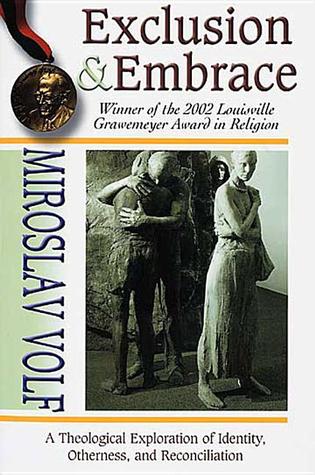
How do we engage the rich diversity of campus life as ‘groups’ come together and engage the ‘outsider’ in the new term? Miroslav Volf‘s Exclusion & Embrace: A Theological Exploration of Identity, Otherness, and Reconciliation (Abingdon Press, 1996) has some material to offer. Read. Review. Share.
Note to all our readers: As I have done previously, I encourage you to read a book before you comment upon it 🙂 It’s my intention that reviews such as those offered by Bob will not only provide opportunity for dialogue by those who have read the material, but also serve as teasers — helping our readers discern what books to place in their personal and book discussion group queue. If you have books you desire to review and/or have reviewed, please email me. ~ Thomas B. Grosh IV, Associate Director of ESN, editor of ESN’s blog and Facebook Wall.
Exclusion & Embrace: A Theological Exploration of Identity, Otherness, and Reconciliation (Miroslav Volf)

Exclusion of the “other” who is different and the violence which can often arise from this has been part of the human story ever since Cain and Abel. This is especially troubling when the other who is different has perpetrated injustice against us or when peoples with radically differing perspectives live side by side. Is there any alternative to estrangement, discord, revenge and violence? Miroslav Volf thinks so.
How is this possible? The answer is in embrace, which Volf ultimately founds in the reconciling work of the cross of Christ–his outstretched arms being the first embrace. He speaks of the drama of embrace, act one of which is opening one’s arms, which means of an openness of oneself to the other. Act two is waiting, which recognizes that embrace cannot be imposed without violence and must be reciprocal. Act three is closing the arms in which each makes space for the other while maintaining one’s own self. Act four is opening the arms once again, which preserves the difference of the other. Volf movingly illustrates the nature of embrace in the parable of the prodigal.

Volf explores the intricacies of gender identity and relationships, the challenges of embrace in situations of oppression and injustice and violence. His engagement with post-modern writers teases out how efforts to fight oppression, injustice, and violence often simply perpetuate all three where the oppressed becomes the oppressor, that no one has a corner on justice and that violence begets violence. Only the open arms that offer forgiveness and by which one opens oneself to the other including seeing with the “double vision” that looks from the perspective of the other as well as one’s own–only this can bring peace, reconciliation, and an escape from violence.
This is an incredibly rich book that deserves multiple readings and is vitally important for any of us engaging a diverse, multicultural world.
Bob Trube is Associate Director of Faculty Ministry and Director of the Emerging Scholars Network. He blogs on books regularly at bobonbooks.com. He resides in Columbus, Ohio, with Marilyn and enjoys reading, gardening, choral singing, and plein air painting.

Leave a Reply